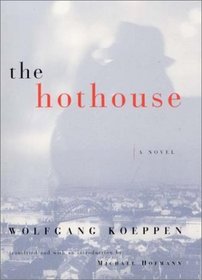Book Description
A masterpiece by a writer long neglected in America, The Hothouse created a literary stir when it appeared in hardcover. Evoking comparisons to works by James Joyce and Malcolm Lowry, it traces the final two days in the life of a minor German politician, Keetenheuve, a man disillusioned by the corruption of post-World War II German politics and grieving after the sudden death of his wife. With a passionate, despairing voice, Wolfgang Koeppen (1906-1996), whom Gunter Grass once called the "greatest living German writer," creates a portrait of idealism crushed by political and personal compromise.
My Review
This is a very well written novel but depicts a very depressed Germany after the war. I didn't enjoy reading this book as it is written in disjointed, fragmented prose with lots of metaphors. It would probably mean more to those who lived through the same experience. I would recommend it for anyone who is interested in German or European history.
A masterpiece by a writer long neglected in America, The Hothouse created a literary stir when it appeared in hardcover. Evoking comparisons to works by James Joyce and Malcolm Lowry, it traces the final two days in the life of a minor German politician, Keetenheuve, a man disillusioned by the corruption of post-World War II German politics and grieving after the sudden death of his wife. With a passionate, despairing voice, Wolfgang Koeppen (1906-1996), whom Gunter Grass once called the "greatest living German writer," creates a portrait of idealism crushed by political and personal compromise.
My Review
This is a very well written novel but depicts a very depressed Germany after the war. I didn't enjoy reading this book as it is written in disjointed, fragmented prose with lots of metaphors. It would probably mean more to those who lived through the same experience. I would recommend it for anyone who is interested in German or European history.




